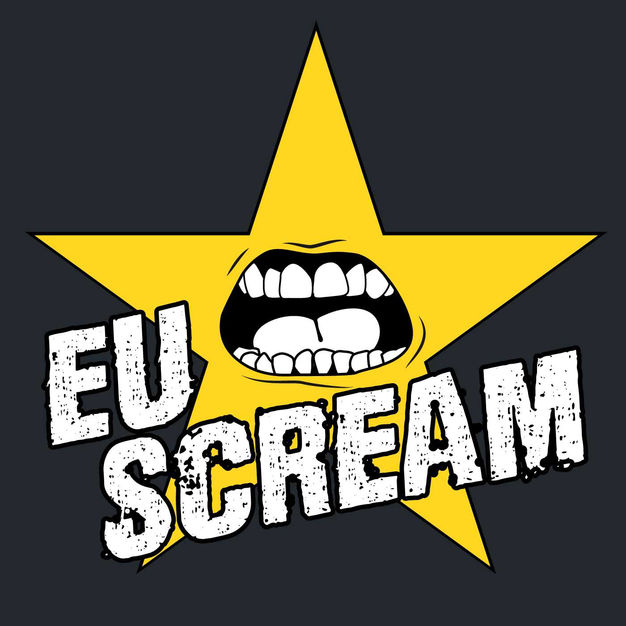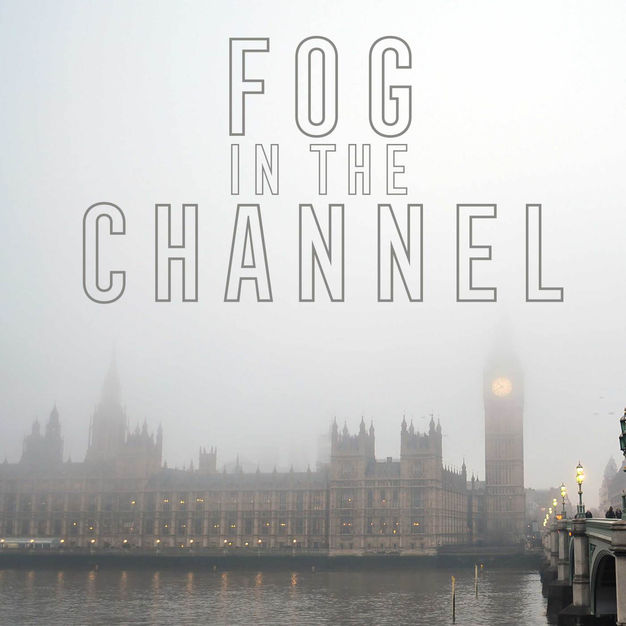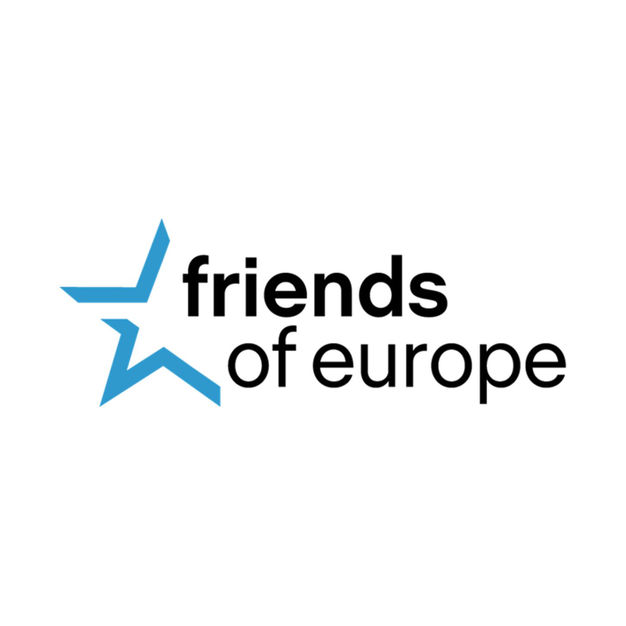
EU Scream
EU Scream
The progressive politics podcast from Brussels
- 1 hour 11 minutesEp.110: Philosophy and Future Generations
Close your eyes. Imagine a young person you know and care about. Picture them at age 90. And then think about the kind of world you want to leave them. Is it ridden by conflict and chaos? Or is it peaceful and habitable? Such thought experiments can lead us to change behaviour and priorities. But they also have wider application to government and policymaking, says social philosopher Roman Krznaric who wrote The Good Ancestor and is Senior Research Fellow at Oxford University’s Centre for Eudaimonia and Human Flourishing. Roman's thinking has become part of a push to get governments and leaders to make better policy choices by taking a far longer perspective. That push seems to be bearing fruit. President of the European Commission Ursula von der Leyen may create a portfolio for intergenerational fairness for her next five-year term, and UN Secretary-General António Guterres seems set to appoint a Special Envoy for Future Generations at a summit this month in New York. But how a focus on future generations works in practice raises thorny questions, among them: how many generations of descendants should we plan for, and over what time spans? And how can the focus on future generations be kept separate from controversial ideas like Longtermism and Effective Altruism that are associated with jailed cryptocurrency mogul Sam Bankman-Fried? Also in this episode: Roman introduces his new book History for Tomorrow in which he explores the role of so-called radical flank movements, like Extinction Rebellion. "It's too late to leave the problems of our time to simmer on the low flame of gradualism," he says. "You need the disruptive movements to accelerate things."
Listen to part one of this series with Elizabeth Dirth of the ZOE Institute.
4 September 2024, 3:00 pm - 38 minutes 4 secondsEp.109: Ministry for the Future IRL
There's a lot of talk right now about future generations. Ursula von der Leyen of the European Commission says she'll create a portfolio with responsibilities for intergenerational fairness. A Summit of the Future to be held in September at the United Nations also helps explain the buzz. In this, the first of two episodes, a conversation with Elizabeth Dirth, member of a real-life network for the future described in Kim Stanley Robinson's bestselling novel The Ministry for the Future. In the book the Ministry helps to push nations beyond a series of dystopian events to bring climate change under control. Elizabeth says it's time to move that approach to the real world, and to give future generations a voice in reshaping the economy, curbing disease outbreaks, and sustaining action on climate change. The ZOE Institute, a German economics think tank where Elizabeth is managing director, is among the organisations pushing the UN Secretary General to appoint a Special Envoy for Future Generations, a role Elizabeth describes as "a potential minister for the future at the UN level." Elizabeth says her ideas are markedly different from that of tech titans like Elon Musk who have a penchant for the future. For Musk and his acolytes, protecting future generations means putting resources into highly speculative technologies that could be highly profitable. They also seem to be betting on colonising Mars — ahead of preserving life on Earth. Listen out for Part Two of this series: a conversation with author and philosopher Roman Krznaric on how far into the future we should plan for, and on whether controversial concepts like Longtermism and Effective altruism have a role to play. Music this episode by Maarten Lichtert.
23 August 2024, 10:00 am - 1 hour 2 minutesEp.108: Accountability in the Von Der Leyen Era, Greece, Pfizer, Iran
Border violence. Hostage diplomacy. Vaccine purchases. Just some of the areas where opaqueness in EU decision-making can erode public trust and ultimately democracy. These also are areas where accountability journalism like freedom of information requests can help uncover undue influence by lobbies and foreign powers as well as abuses by security services. One of the highest profile cases of accountability journalism in Europe to date is the decision by The New York Times to sue the European Commission for access to phone messages — messages in which the Commission's president, Ursula von der Leyen, and the chief executive of Pfizer, Albert Bourla, reportedly negotiated vaccine purchases during the Covid-19 pandemic. Matina Stevis, the outgoing Brussels bureau chief for the Times, who is part of that lawsuit, says such scrutiny would be comparatively banal in jurisdictions like the US where news media and government regularly wrangle in court over the line between an executive's ability to govern and the public's right to know. But in the EU such scrutiny still can arouse accusations of euroscepticism and even sympathies with Brexit. Matina says the EU's accountability muscles need "deepening and flexing and exercising" but she also suggests reporters working EU corridors may need to do more to avoid "falling into the traps of access journalism" and "going, going softly so that people keep answering their phones when you call." Also in this episode, the pros and cons of reporting on the case of Johan Floderus, the EU official recently released from captivity in Iran. And a hard and harrowing look at the evidence of deadly actions by the Greek coastguard toward migrants on the Mediterranean Sea — and at the half-hearted attempts by Brussels to rein in such abuses amid tectonic shifts in refugee law and policy. These include calls for the so-called externalization of migration where refugees and asylum seekers must have their applications to enter the EU assessed offshore in countries like Albania or even Rwanda. Such shifts also entail discussions on reforming and even abandoning the 1951 Refugee Convention that was a key plank of postwar humanitarianism.
29 June 2024, 3:00 pm - 1 hour 1 minuteEp.107: Shame, Falsification, Normalisation of Radical Right, EU Vote, The Lonely Olive
How did politics long deemed unacceptable go mainstream so quickly? Pundits have blamed disinformation, social media and growing distrust of elites. But these factors don't adequately explain how illiberalism and identitarian ideologies have spread so rapidly even to countries thought to be immune. It's a puzzle Portuguese political scientist Vicente Valentim set out to solve. In this episode Vicente discusses his findings against the backdrop of European Parliament elections that are expected to deliver more seats than ever for radical right lawmakers. Vicente's research demonstrates that a larger proportion of the population than previously assumed already had views at odds with liberal democracy. Initially these individuals kept these views latent, or private, falsifying their preferences for fear of social disapproval like losing a job. But a trigger event for example an influx of migrants emboldened some of these individuals to break with social norms and to air their views more publicly. Political entrepreneurs then spotted an opportunity to win elections by amplifying these views, and these first successes at the ballot box prompted even more skilled and savvy politicians also to promote a radical right agenda. As the shame and stigma at expressing pre-existing radical right views fell away there was a rapid normalisation of the radical right. Vicente also discusses the phenomenon of feminationalism in light of the rise of Giorgia Meloni of Italy and Marine Le Pen of France. These leaders cultivate an "aura of ambiguity" to gain mainstream acceptance and to continue to connect with their more extreme bases. Vicente says trying to keep radical right preferences latent may seem appealing but masks the dangers to groups like vulnerable minorities. Better to have long-term strategies at the level of civics and education and to instil liberal democratic values early. Vicente's forthcoming book The Normalisation of the Radical Right has been lauded by leading political scientists like Daniel Ziblatt of Harvard and Catherine E. de Vries of Bocconi who calls it "an instant classic for anyone interested in the future of our democracies.”
6 June 2024, 5:00 pm - 58 minutesEp.106: Palestinian State, Ireland, Tony Connelly, James Joyce
Ireland and Spain are to grant formal recognition to a Palestine state as soon as this month. The move puts Dublin and Madrid at odds with most other EU states and with the United States. Sweden is the only other state to have recognised Palestine during its membership of the EU, and that was a decade ago. In this episode, Tony Connelly, the Europe editor for the Irish public broadcaster RTE, describes the historical and political backdrop to Ireland's decision. Reasons include pressure from the left-wing party Sinn Féin, the former political wing of the Irish Republican Army that had operational ties with the Palestine Liberation Organisation. Recognition is a way to give moral support to Palestinians particularly in Gaza where the Israeli military has killed around 35,000 people in response to the attack by Hamas terrorists on Oct. 7 that killed around 1,200. Recognition also marks a significant break with the long-established view that Palestinian statehood only should come after a two-state agreement with Israel. But who Dublin would recognise as the representatives of a Palestinian state remains an open question, and there's little expectation of any immediate impact on the Gaza conflict. The move also adds to bad blood between Dublin and Tel Aviv that's been aggravated by recent spats involving former prime minister Leo Varadkar and the Eurovision performer Bambie Thug. While a shared struggle for independence helps explain Irish readiness to lend Palestinians support, how modern Irish history maps onto Palestine is far from straightforward. During the 1920s some 700 Irish police were deployed to British-administered Mandatory Palestine to support a mostly British police force with a reputation for brutality, the Black and Tans. And in the 1940s Jewish militants fighting the British in Palestine actually identified with the IRA and its leaders like Michael Collins. An ambiguous Irish relationship with Zionism can be seen in novelist James Joyce's masterwork Ulysses. Joyce's protagonist Leopold Bloom proclaims unity among "all, jew, moslem and gentile" even as he must contend with virulent antisemitism in Dublin. Read Tony's recent reporting from the West Bank and watch the trailer for his TV documentary about his grandfather.
18 May 2024, 7:00 am - 42 minutes 3 secondsEp.105: Abortion Politics, EU Elections, Austria, Papayas, Slovenia
Abortion is a deal breaker for some voters. That's the case in the US where Joe Biden is making Donald Trump pay a political price for his role in overturning Roe vs. Wade. That's also been the case in Poland where a wellspring of pro-choice sentiment helped remove the ultraconservative Law and Justice party last year. So could that same dynamic have an impact on voter choice across Europe? Yes, says Nika Kovač, the coordinator of the My Voice, My Choice campaign, which recently launched a petition for a million signatures using a European Citizens Initiative. My Voice, My Choice proposes a new EU fund to backstop abortion rights in Europe no matter what EU member state they live in. Women still could afford to go to other EU states offering the procedure — assuming crossing EU state lines isn't called into question. But for Nika and team members like Kristina Krajnc and Maria Mayrhofer, their campaign is not just a health or feminist matter. It's also about turning the spotlight on abortion rights to diminish the electability of the hard-right and ultraconservative theocrats in the European elections next month, in legislative elections in Austria this fall, and in other upcoming contests.
7 May 2024, 5:00 pm - 1 hour 4 minutesEp.104: Free speech, National Conservatives, Cordon sanitaire, CPAC
What's the best approach to fighting the hard right? Suppressing toxic views? Or contesting them publicly? The answer lies in the middle of course — an open society must retain the means to reject intolerance and hate. But what's clear from recent events in Brussels is that hasty and ham-fisted bans on the hard right can amplify rather than diminish their message. In this episode the Charlemagne columnist at The Economist Stanley Pignal describes how Brussels mayors sought to shutout a conference organised by the National Conservativism movement. Those efforts backfired spectacularly. Not only did the hard-right's show go on (albeit at a down-at-heel dancehall and events venue) but the National Conservatives garnered global media attention. The likes of Nigel Farage, Viktor Orbán and Éric Zemmour lined up to claim they were victims of cancel culture. But the deleterious effects of their policies on Ukraine's war effort, women's health, the LGBTQI community and racialised communities got far less attention. Read Stanley's Charlemagne column about how the NatCon conference morphed into a crisis for liberalism.
22 April 2024, 11:00 am - 1 hour 15 minutesEp.103: Politics and Eurovision, Sweden v France, Ukraine v Russia, Israel
Some people love Eurovision. Others don't get it. But beyond the camp and kitsch of the annual song contest there's much to observe about the politics of Europe and the wider region. In this episode, author and broadcaster Dave Keating starts with discord between Sweden and France over language. The sourest notes were struck in the mid-1970s after the Swedish group ABBA won with a song in English alluding to the historic French defeat at Waterloo. The French then stepped up their campaign against contestants using lyrics other than in their national languages. The so-called ban on English was only lifted in 1999 just as Sweden was once again emerging as a pop music powerhouse and as Eastern and Central Europe states were emerging from behind the Iron Curtain. They too were keen to sing in English. Since the turn of the century Eurovision has been buffeted by tensions between Russia and countries like Georgia and Ukraine that have used their performances to denounce Moscow. The dissonance has sorely tested the European Broadcasting Union, the state and public media alliance covering 56 countries behind Eurovision. Russia has traditionally been a major TV market for the contest and the Union only excluded Russian participation in 2022, after the full-scale invasion of Ukraine. In the build-up to this year's contest in Malmö, Sweden, on May 11, the focus has been on Israel's entrant Eden Golan amid the ongoing bloodletting in Gaza. Despite an outcry from artists and performers against the participation of Israel — and despite accusations of double standards now that Russia has been excluded — Golan looks set to perform. Israeli visitors to Malmö have been advised to keep a low profile while Swedish authorities have said they're well prepared for protests, including inside the contest arena. Read Dave's latest Substack about Eurovision.
7 April 2024, 1:00 pm - 1 hour 7 minutesEp.102: European Parliament and Race, Aya Nakamura, Diversity and Policing
Opposition to French-Malian singer Aya Nakamura performing at the Paris Olympics is whipped up by the "fachosphère" in France. The former head of the EU Border and Coast Guard joins the far-right and accuses former colleagues of a "project" to encourage migration. Those are just two recent examples of the kinds of prejudice and conspiracy theory that Julie Pascoet confronts at the European Network Against Racism, ENAR. In this episode Julie, who is based in Brussels, talks about poor representation of racialised groups at the only directly elected EU institution, the European Parliament. A recent study commissioned by ENAR shows that the proportion of racialised lawmakers stands at just 3.3 percent since the departure of British members. That compares to an estimated proportion of racialised people in Europe of around 10 percent, says Tina Magazzini of Integrim Lab, which conducted the study. Tina now expects the percentage at the parliament to sink even lower following EU elections in June. Also in this episode: European Commissioner for Home Affairs Ylva Johansson answers questions about the infiltration of law enforcement by extremist forces, gang violence in Sweden, and police brutality in France — and she encourages much greater diversity in policing. "What we also see is a very male, white police force” but “it’s important that the police also reflect the whole society."
25 March 2024, 8:00 pm - 51 minutes 21 secondsEp.101: Greenland Trump, WW3 Denmark, Rwanda Model, War Council
Donald Trump wanted to buy it; Mette Frederiksen said it wasn't for sale. Greenland and its ownership is for Greenlanders to decide, the Danish prime minister told President Trump five years ago. In this episode Karin Axelsson, EU correspondent for the respected Danish daily Politiken, reflects on why the world's biggest island, which gained autonomy from Denmark 45 years ago and then withdrew from the European Union, is back in the headlines. Reasons include the visit by European Commission President Ursula von der Leyen to the Greenlandic capital Nuuk to inaugurate an EU office. High on her agenda: accessing the island's abundant deposits of critical metals and minerals for industries of the future. Karin also discusses growing unease over the threat posed by Russia. Jitters in Denmark were exacerbated by French President Emmanuel Macron's comments about putting European boots on the ground in Ukraine — and by Prime Minister Frederiksen's comments evoking World War Three. On the topics of migration and asylum, Karin explains how Prime Minister Frederiksen's plan to outsource controls to Rwanda went beyond what was envisaged by similarly hawkish leaders in Britain. That Danish plan is now stalled, says Karin, but it would go as far as blocking people granted asylum from choosing to come to Denmark. Such Rwanda-style plans were previously seen as too extreme by EU policymakers. But that may be changing. An election manifesto put forward by von der Leyen's center-right European political family would outsource such controls to non-EU countries while capping the numbers of people granted asylum eligible to come to the EU.
17 March 2024, 10:00 am - 46 minutes 8 secondsEp.100: Frontex in Greece, Abortion in France
Frontex, the EU border and coast guard, is the bloc's best funded agency costing upwards of a billion euros a year. There are plans for a standing corps of 10,000 uniformed personnel this decade. But something is badly amiss. Migrants keep drowning in large numbers under Frontex's watch. That includes what is thought to be the worst disaster of its kind when the fishing vessel Adriana capsized in June last year in Greek waters with some 750 people aboard. An estimated 600 people perished in that catastrophe. In response, the European Ombudsman, Emily O'Reilly, looked under the hood at Frontex and at its relations with national coast guards. She found an institution that calls itself a border and coast guard but that lacks the power to carry out some of the basic duties that come with such an important job. Frontex must check with national authorities like the Hellenic Coast Guard before rescues and even before conducting additional surveillance. As for issuing emergency Mayday alerts — something Frontex can do — the agency still has no set protocol. You might say that weaker-than-advertised EU institutions are a reality of a European project where member states are reluctant to cede sovereignty. But in the case of Frontex the results are so lethal and inhumane that EU claims to uphold fundamental rights are undermined on a daily basis. In this episode Emily describes her inquiry into the Adriana and lays out her recommendations for fixing some of what ails Frontex. Emily also discusses the move by France to enshrine abortion rights in the constitution. She does so from the perspective of a former journalist who wrote about reproductive rights in Ireland in the 1980s and 90s, including in her book Masterminds of the Right.
10 March 2024, 7:00 am - More Episodes? Get the App
- http://www.euscream.com
- en-us
Your feedback is valuable to us. Should you encounter any bugs, glitches, lack of functionality or other problems, please email us on [email protected] or join Moon.FM Telegram Group where you can talk directly to the dev team who are happy to answer any queries.
 Centre for European Reform
Centre for European Reform
 Paul Adamson in conversation
Paul Adamson in conversation
 Leading Views podcast
Leading Views podcast
 Fog in the Channel
Fog in the Channel
 Friends of Europe podcasts
Friends of Europe podcasts
 Social Europe Podcast
Social Europe Podcast